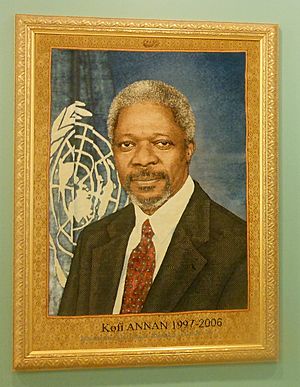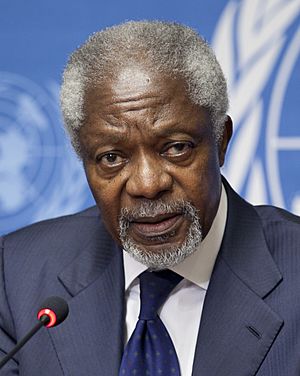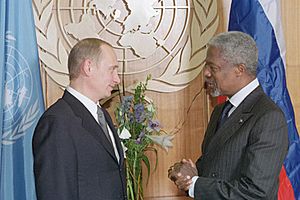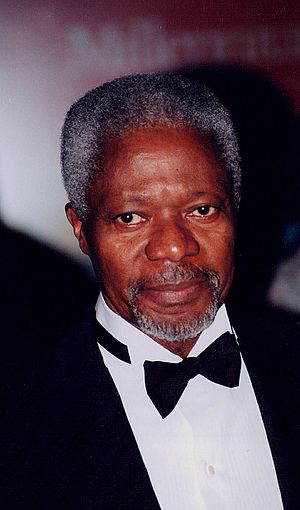Kofi Annan facts for kids
Quick facts for kids
Kofi Atta Annan
|
|
|---|---|
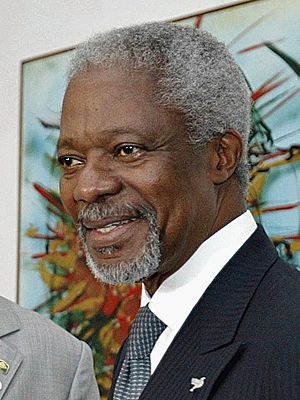 |
|
| 7th Secretary-General of the United Nations | |
| In office 1 January 1997 – 1 January 2007 |
|
| Preceded by | Boutros Boutros-Ghali |
| Succeeded by | Ban Ki-moon |
| Personal details | |
| Born | 8 April 1938 Comassie, Gold Coast (now Kumasi, Ghana) |
| Died | 18 August 2018 (aged 80) Bern, Switzerland |
| Nationality | ghanaian |
| Spouses | Titi Alakija (div.) Nane Maria Annan |
| Signature |  |
Kofi Annan (born April 8, 1938 – died August 18, 2018) was a Ghanaian diplomat. A diplomat is someone who represents their country in talks with other countries. He was the seventh Secretary-General of the United Nations. This is like being the main leader of the UN. He held this important job from January 1, 1997, to December 31, 2006. Kofi Annan and the United Nations together won the Nobel Peace Prize in 2001. They received the prize for their efforts to create a more organized and peaceful world.
Contents
Early Life and Family
Kofi Annan was born in Kumasi, Ghana. His family was well-known and respected. His parents, Henry Reginald and Victoria Annan, came from two main groups of people in Ghana called the Akan.
His father was part Asante and part Fante. His mother was Fante. The Asante people were known for trading gold. The Fante people often helped trade gold between the Asante and the British.
Kofi's first name means "born on a Friday". He also had a twin sister who passed away in 1991. In Ghanaian culture, twins are seen as very special.
Kofi Annan likely learned about politics and diplomacy from his family early on. Both of his grandfathers and his uncle were tribal chiefs. After his father retired from working for a cocoa company, he was chosen as the governor of Ghana's Asante province.
Education and Learning
In 1954, Kofi Annan went to Mfantsipim School. This was a Methodist boarding school in central Ghana. Annan later said that this school taught him a very important lesson. He learned that "suffering anywhere concerns people everywhere." This means that problems in one part of the world affect everyone.
Annan then studied at Macalester College in St. Paul, Minnesota. He graduated from there in 1961. Later, in 1971 and 1972, he was a special student at MIT. There, he earned a master's degree in management. This degree helped him learn how to lead and organize large groups.
Working at the United Nations
Kofi Annan became the Secretary-General of the United Nations in January 1997. He took over from Boutros Boutros-Ghali, who was from Egypt. Annan had worked for the U.N. for a long time. He started his first job with the organization in 1962. He moved up through many different roles.
Before becoming Secretary-General, he was a Deputy Director for refugees from 1980 to 1983. He also led the U.N.'s efforts to keep peace from 1995 to 1996. Kofi Annan was the first Secretary-General to be chosen from people who already worked for the U.N. He was also the first black person to hold this job. He was the second African leader to be Secretary-General. His second term began in 2002 and ended in 2006.
In 2001, he and the United Nations received the Nobel Peace Prize. They won it for their work to create a more organized and peaceful world.
After the UN: Helping the World
After finishing his time as UN Secretary-General, Kofi Annan moved to Geneva, Switzerland. He continued to work on many important projects around the world. These projects aimed to help people and improve lives.
In 2007, Annan started the Kofi Annan Foundation. This is an independent group that does not work for profit. Its goal is to make global leadership better. It also helps countries and people become stronger. The foundation works to create a fairer and safer world for everyone.
Annan also led the Global Commission on Elections, Democracy and Security. This group started in 2011. It brought together 12 important people from around the world. They included leaders like Madeleine Albright. The commission wanted to show how important fair elections are for a secure and stable world. In 2012, they released a report about improving elections worldwide.
Other Ways He Helped
Kofi Annan was involved with many other groups. These groups focused on global issues and helping Africa. Some of his roles included:
- Being on the board of directors for the United Nations Foundation.
- Serving as the chancellor of the University of Ghana.
- Being a fellow at Columbia University.
- Leading the prize committee for the Mo Ibrahim Prize. This prize recognizes good leadership in Africa.
- Being the chairman of the Alliance for a Green Revolution in Africa (AGRA). This group works to improve farming in Africa.
- Founding and leading the Global Humanitarian Forum.
Annan also led a group called The Elders. This group is made up of independent global leaders. They work together on issues like peace and human rights. He also chaired the Africa Progress Panel. This group of ten leaders worked to promote fair and lasting development in Africa.
Honors and Memory
The United Nations Postal Administration released a new stamp in Kofi Annan's memory on May 31, 2019. The picture of him on the stamp was created by artist Martin Mörck. Two important centers in Accra, Ghana, are named after him: the Kofi Annan International Peacekeeping Training Centre and the Ghana-India Kofi Annan Centre of Excellence in ICT. A university in Guinea, the Kofi Annan University of Guinea, is also named in his honor.
Personal Life
Kofi Annan was married to Nane Annan. She is a lawyer and artist from Sweden.
Death
Kofi Annan passed away on August 18, 2018. He was 80 years old. He died in Bern, Switzerland, after a short illness.
Related pages
Images for kids
-
Annan with US Secretary of State Condoleezza Rice in 2006.
-
Annan during the South Sudanese independence referendum with fellow elder Jimmy Carter in 2011.
See also
 In Spanish: Kofi Annan para niños
In Spanish: Kofi Annan para niños
 | Aaron Henry |
 | T. R. M. Howard |
 | Jesse Jackson |


